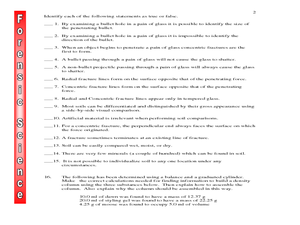Personal Genetics Education Project
DNA, Crime and Law Enforcement
Civil rights meets biotechnology in a instructional activity that scrutinizes the collection of DNA of citizens who have been arrested, but not yet convicted of a crime. Real-life cases are examined in which the DNA of a relative was...
Curated OER
The Great Cafeteria Caper
Students extract DNA from their own hair roots. They run an electrophoresis gel to examine patterns of their DNA along with standard DNA. The experiment is based on a crime scene scenario.
Curated OER
Tech: Medical Forensics
High schoolers explore what it takes to be a forensic scientist or pathologist. They view a PowerPoint, discuss what education and skills are needed to succeed as a pathologist. They play a game to test their observation skills, a skill...
Curated OER
AP: Chapter 20: DNA Technology
This nine-page biotechnology resource contains six pages of questions regarding DNA technology. Questions cover cloning, restriction enzymes, the polymerase chain reaction, different techniques, the human genome project, and more. The...
Curated OER
Fingerprints
This activity provides an interesting way for learners to review vocabulary and practice comprehension skills. There is a six-paragraph passage about the process of fingerprinting and the role it takes on convicting criminals. Eleven...
Curated OER
Fly Forensics
Freddy's Friendly Fruit Market is under attack by fruit flies, and it is up to your aspiring biologists to solve the crime! By reading and analyzing the phenotypes, detectives determine which fly is responsible. This memorable assignment...
Curated OER
Solving Mysteries Using Paper Chromotagraphy
Young scholars solve the mystery of the kidnapped teacher by analyzing a ransom note using paper chromatography. They carefully prepare ink samples from the note to known ink samples to determine the kidnapper.
Curated OER
Measurable You!
Conduct guided experiments and discussions while collecting anthropometric measurements. Your class will explore impact of experimental errors in a scientific system, and explain their observations/findings in writing. An introduction to...
Curated OER
Glass and Soil
In this forensic science lesson, students sketch bullet line fractures and complete 16 short answer questions on glass and soil evidence.
Curated OER
Physical Evidence
In this forensics instructional activity, learners complete 14 short answer questions related to physical evidence. They explain how certain types of evidence are handled upon recovery from the crime scene.
Curated OER
Cardiac Arrest! Using Forensics to Investigate Cardiovascular Anatomy and Function
Students identify the different parts and functions of the cardiovascular system. In this forensics lesson, students collect and analyze evidence on a fictional crime. They describe different causes of cardiac arrest.
Curated OER
Crime Scene Documentation
Learners become forensic investigators. In this crime scene lesson, students go to the science lab which is the "scene of the crime." They collect evidence such as fingerprints, "blood" evidence, chromatography, footprints, and more.
Curated OER
Name That Tune: Matching Musical Tones Through Waveform Analysis
Pupils detect the waveform of musical notes to determine the code for the "safe" in this forensics simulation lesson. They use a microphone and tuning forks along with Vernier EasyData on their graphing calculator to analyze five musical...
Curated OER
Solving Imaginary Crimes
Students participate in a forensic science activity. For this crime solving lesson, students investigate fingerprints, and other crime scene evidence to solve an imaginary crime.
Curated OER
Dead Body Math
Learners solve the mystery of dead Mr. Potato Head using physics and algebra. They discuss Newton's Law of cooling as it applies to the mystery scenario involving a cooling baked potato as the "victim". They manipulate algebraic...
Curated OER
The Case of Similar Substances
Students solve a crime mystery using chemical tests. They review the crime scenario and then become familiar with the procedure and results for two tests used to identify unknown powders. They perform the tests on the crime samples and...
Curated OER
Trichinella Forensics
Students engage in DNA manipulation using forensics techniques. Students investigate topics involved in forensics studies such as cloning, electrophoresis, gene mapping, replication, and transcription.
Curated OER
DNA AND BLOOD TYPING
Learners list three descriptive characteristics and three functions of DNA, describe two ways that genetics is important in a forensic investigation, and list the four major human blood types.
Curated OER
Fingerprint Identification 3
In this forensic science activity, students identify 12 fingerprint marks. They classify them according to the pattern made.
Curated OER
Fingerprint Identification 4
In this forensic science worksheet, students identify 16 fingerprints according to its type. They classify them as either whorl, loop or arch.
Curated OER
Hair Test
In this forensic science worksheet, students write an answer to 1 open response question about a given hair evidence collected from the crime scene.
Curated OER
Confectionary Bureau of Investigations: Case of the Cookie Mystery
Learners perform tests on different chemicals to determine their chemical properties. In this forensic science lesson, students identify an unknown sample using its physical and chemical properties. They solve a fictional crime using...
Curated OER
Using Blood Tests to Identify Babies and Criminals
Students solve a crime by matching a suspect's blood type to physical evidence collected at the crime scene. In this forensic science lesson, students identify the different blood types. They explain how blood tests work.
Curated OER
Careers in Chemistry
Students watch a video about careers in chemistry. In this Chemistry lesson plan, students will research chemistry careers and chose one to do further research on.

























